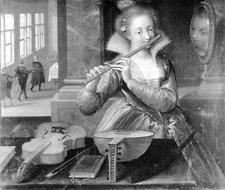For younger visitors
On a historical scale, the modern metal flute and the
way we play it are both fairly new. If your great-grandfather
played the flute, chances are he played music you have
never heard on a kind of flute you would not recognize.
And as for your great-grandmother: it's unlikely she
played the flute at all, since it was not considered
suitable for women in her day.
This site contains information about many different
kinds of flute and flute-playing that existed before
the era of the modern flute. Knowing about earlier instruments
and practices helps us better understand the music people
played on them in those times, and this gives us a better
sense of how to play that music today--as we often do.
 You
may have read how the modern flute developed from simple,
defective earlier instruments. If mechanical complexity
was the only measure, it would be true to say early
flutes were simple.But in fact, the story is much more
interesting than that. The flute was mechanically developed
at just the right time--neither too soon nor too late.Both
before those mechanical developments and after them,
instruments were perfectly suited to the music they
were meant to play.That's really the theme of this site. You
may have read how the modern flute developed from simple,
defective earlier instruments. If mechanical complexity
was the only measure, it would be true to say early
flutes were simple.But in fact, the story is much more
interesting than that. The flute was mechanically developed
at just the right time--neither too soon nor too late.Both
before those mechanical developments and after them,
instruments were perfectly suited to the music they
were meant to play.That's really the theme of this site.
If you are reading this page because you have been
assigned the task of writing about the history of the
flute for a school project, you may find useful material
here. But be warned: the information is presented in
some detail, and may take you a long time to read and
digest. The best place to get a sense of what's here
is probably the Timelines.
By the way: pictures on this site are copyright and
can't be re-used.
If you are already a fairly advanced flutist and are
interested to know more about the history of your instrument,
browsing this site over the course of several visits
may help give you a sense of the subject. You can find
more online and printed information under Resources
in the navigation column. If you're looking for a particular
piece of information, try the Search box on any page,
or construct a more precise query on our Search
page.
The ability to leave comments using the Interactive
box at the bottom of each page has been disabled owing
to abuse by children.
Happy browsing, and fluting!
|